HRC55: Obstacles to the Peace Agreement in Colombia
The 55th Session of the Human Rights Council
26 February – 5 April 2024
Item 10 – ID with International Expert on Colombia
2 April 2024
By Héloïse Carel / GICJ
Executive summary
On 2 April 2024, during the interactive dialogue with international expert Mrs Antonia Urrejola on Colombia, key issues surrounding the Peace Agreement took centre stage. Concerns were raised about the government's commitment to implementing the agreement and the impact of conflicts on transitional justice mechanisms. Representatives from various countries and international organisations highlighted the importance of addressing issues such as gender-based violence, impunity, and corruption in Colombia. They also emphasised the need for the international community to support Colombia in its efforts to implement the peace agreement effectively. Expert Urrejola stressed the importance of addressing ethnic and gender-based discrimination and called for stronger institutional cooperation to avoid duplication of efforts. She also underlined the crucial role of civil society in peacebuilding efforts and called for progress in identifying perpetrators of human rights violations. Additionally, she advocated for establishing a high-level agency to ensure coordinated implementation of the agreement.
Context
The Colombian government is engaged in a long-standing conflict with various insurgent groups, most notably the Revolutionary Armed Forces of Colombia (FARC), founded in 1964. The conflict stemmed from deep-rooted socio-political and economic issues, including inequality, land disputes, and the absence of state presence in rural areas.
The FARC was initially formed as a Marxist-Leninist guerrilla group aimed to overthrow the government and establish a socialist state. Over the last few decades, the conflict has resulted in widespread violence, displacement of millions of people, human rights abuses, and involvement in drug trafficking to fund their activities.
In addition to the FARC, other non-governmental armed groups, such as the National Liberation Army (ELN) and paramilitary groups, have also contributed to the conflict, further exacerbating the situation. These groups often clash with each other and with government forces, leading to a protracted and complex conflict.
The issue of drug trafficking has further complicated the situation in Colombia. The country's strategic location and geography make it a key transit point for the trafficking of cocaine and other narcotics. Various armed groups, including the FARC, have become involved in the drug trade to finance their operations, leading to increased violence and instability.
Amidst this backdrop of conflict and drug trafficking, efforts to negotiate a Peace Agreement began in the early 2010s. After several years of negotiations, the Colombian government and the FARC signed a historic Peace Agreement in 2016. The agreement aimed to end more than five decades of armed conflict, address the root causes of the conflict, and pave the way for reconciliation and development in Colombia.
The Peace Agreement included provisions for transitional justice, rural reform, political participation for former combatants, and efforts to combat drug trafficking and illicit crops. It also sought to provide reparations to victims of the conflict and promote truth and reconciliation through mechanisms such as the Truth Commission and the Special Jurisdiction for Peace.
While the Peace Agreement marked a significant milestone in Colombia's history, its implementation has faced numerous challenges, including political opposition, security concerns, and delays in fulfilling key provisions. Despite these challenges, efforts to implement the Peace Agreement continue, supported by the Colombian government, international organisations, and civil society groups, as Colombia strives to achieve lasting peace and stability.
Summary of the UN report
The report, authored by international human rights expert Antonia Urrejola, underlined a comprehensive examination of Colombia's journey towards implementing the 2016 Peace Agreement. It meticulously delved into the myriad obstacles hindering the full realisation of the agreement's objectives, paying close attention to issues highlighted by the Special Jurisdiction for Peace in March 2023. While recognising progress, such as integrating peace-related legislation and advancements in transitional justice mechanisms, the report soberly acknowledged the persistent challenges impeding sustainable peace in Colombia.
A central theme of the report was the necessity for the Peace Agreement to transcend political cycles and become firmly entrenched as consistent state policy. This entailed robust efforts to fortify inter-institutional coordination, address systemic corruption, and expedite the execution of the agreement's ethnic and gender provisions. Moreover, the report underlined the critical role of civil society, the active involvement of victims, and the unwavering international support in navigating the complexities of peacebuilding in Colombia.
In essence, the report served as a clarion call for concerted action at both national and international levels to overcome the multifaceted challenges obstructing Colombia's path to enduring peace. It advocated for a holistic approach prioritising inclusivity, accountability, and genuine commitment to the principles enshrined in the Peace Agreement. Since signing the Peace Agreement in 2016, Colombia has embarked on a multifaceted journey of legislative adaptation and institutional transformation to realise the promises of peace. This endeavour saw 73 out of 107 necessary norms integrated into Colombia's legal framework, representing a significant stride towards comprehensive Peace Agreement implementation. Legislative advancements included the establishment of transitional justice mechanisms, laws promoting democratic processes and political opposition, and initiatives addressing agrarian inequality.
In the realm of transitional justice, the report highlighted notable progress, exemplified by the Special Jurisdiction for Peace initiating 11 macro-cases and strategic efforts of the Unit for the Search of Persons Deemed as Missing. Equally significant was the culmination of the Truth Commission's work, culminating in a comprehensive final report published in June 2022. This report illuminated Colombia’s conflict’s structural underpinnings and laid a roadmap for truth and reconciliation, emphasising the intersectionality of violence and the imperative of addressing its multifaceted nature.
However, despite these advancements, challenges persisted on the path to sustainable peace. Delays in implementing the Truth Commission's recommendations and issues surrounding victim participation in legal proceedings presented formidable obstacles. Concerns have also been raised regarding the limitations of the Special Jurisdiction for Peace, particularly its lack of mandatory jurisdiction over third-party civilians involved in conflict-related atrocities. These challenges underscored the complexity of transitional justice processes and the need for continued engagement and support from all stakeholders.
In conclusion, Mrs. Antonia Urrejola underlined that while Colombia has made commendable progress in legislative adaptation and transitional justice, the journey towards sustainable peace was far from over. Addressing the remaining obstacles would require sustained commitment, proactive engagement, and a steadfast dedication to the principles of truth, justice, and reconciliation. Only through collective efforts can Colombia realise the full potential of its Peace Agreement and build a future characterised by lasting peace, justice, and prosperity.
Interactive dialogue
Mrs Urijola opened the floor with a statement examining the myriad challenges that have impeded the comprehensive implementation of the 2016 Peace Agreement in Colombia, as mandated by Resolution 53/22. After meticulously reviewing the situation, she adeptly navigated the complexities of post-conflict dynamics, highlighting both strides made and persistent obstacles encountered along the path to lasting peace.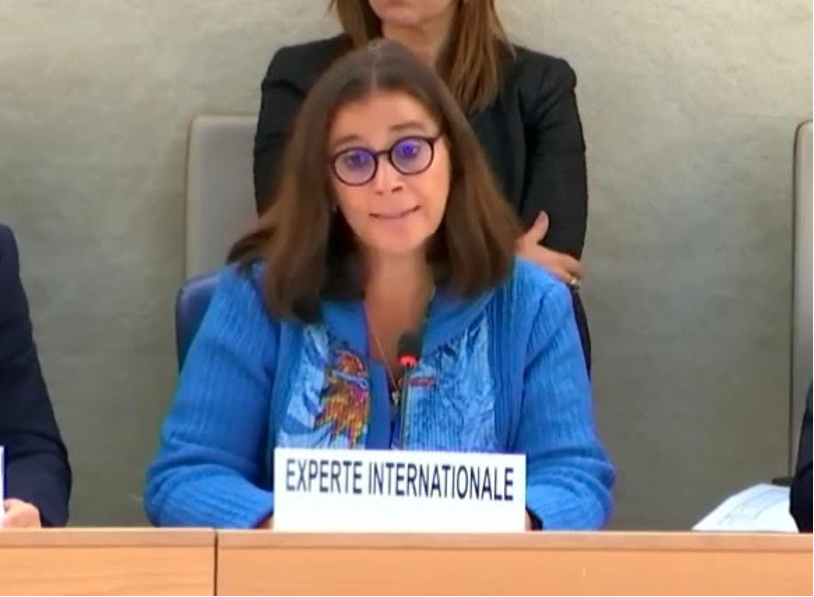
Beginning with acknowledging the incremental progress in certain domains, such as rural reform and transitional justice, Mrs Urijola juxtaposed these advancements against the backdrop of enduring challenges that continue to thwart the full realisation of the Peace Agreement's objectives. Despite commendable efforts, she noted, there remains a palpable need for sustained governmental commitment to the agreement's implementation, resulting in fluctuations in progress and setbacks in various regions across the country.
Central to her discourse was the pernicious spectre of violence, which continues to haunt Colombia's post-conflict landscape. Mrs Urijola drew attention to the persistent threat posed by armed groups in regions where state presence is lacking, exacerbating insecurity and perpetuating cycles of violence that undermine the agreement's core principles. Moreover, she underscored the dire consequences of this violence on vulnerable populations, particularly rural communities, ethnic groups, and human rights defenders who bear the brunt of the conflict's lingering aftermath.
In her analysis of human rights violations affecting signatories of the agreement, Mrs Urijola painted a stark picture of impunity and injustice. The alarming number of killings and the sluggish pace of legal proceedings underscored systemic challenges that continue to undermine the rule of law and erode trust in institutions tasked with upholding justice and accountability.
Of particular concern was the obstruction of justice by the Attorney General's Office, exemplified by the troubling case of Jesus Santrich. Mrs Urijola meticulously dissected the complexities of this case, exposing the intersection of political hostility, institutional shortcomings, and legal ambiguity that have cast a shadow over efforts to achieve meaningful reconciliation and reintegration for former combatants.
Despite these formidable challenges, Mrs Urijola remained resolute in her conviction that the path to sustainable peace is not beyond reach. In a compelling call to action, she outlined a series of recommendations aimed at galvanising governmental commitment, bolstering institutional capacity, and fostering greater inclusivity in the peace process. From enhancing security measures to combating corruption and promoting ethnic inclusivity, her recommendations offered a comprehensive roadmap for overcoming entrenched obstacles and advancing the cause of peace and reconciliation in Colombia.
In closing, Mrs Urijola reiterated the imperative of collective action and international solidarity in supporting Colombia's journey towards lasting peace. She expressed gratitude to civil society organisations and victims' groups for their unwavering dedication and urged the international community to stand in solidarity with Colombia as it navigates the complexities of post-conflict reconstruction and reconciliation.
The delegate of Colombia expressed gratitude to the expert for her insightful report on the obstacles obstructing the implementation of the Peace Agreement in Colombia. This report, noted for its balanced portrayal, effectively encapsulated the numerous challenges faced by the Colombian government and its unwavering dedication to addressing these impediments.
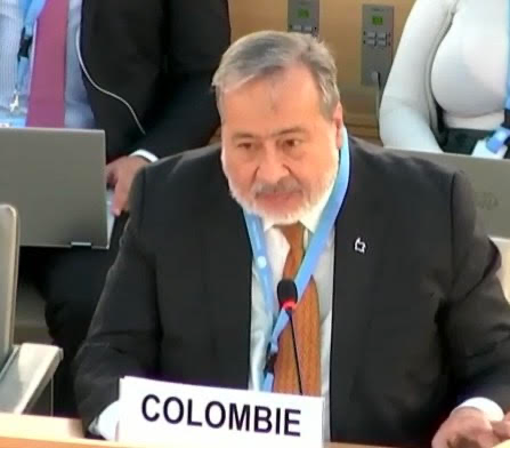 Beginning with the case of Santrich, the delegate emphasised the importance of the Attorney General's Office promptly investigating the complaint raised by the Special Jurisdiction for Peace. It was hoped that the office would avail itself of independent technical assistance to ensure thorough and timely results.
Beginning with the case of Santrich, the delegate emphasised the importance of the Attorney General's Office promptly investigating the complaint raised by the Special Jurisdiction for Peace. It was hoped that the office would avail itself of independent technical assistance to ensure thorough and timely results.
Moving on, the delegate underscored the urgency of putting an end to violence within Colombian territories, stressing the government's commitment to realising a vision of total peace and civilisation. Key areas such as housing, education, and technical assistance for productive projects and families were highlighted as crucial areas demanding immediate attention. The delegate also acknowledged the progress made in amnesty and restorative justice initiatives, while also recognising the necessity to overcome deficiencies in the coordination between national, departmental, and municipal authorities.
Regarding corruption and impunity, the delegate recalled recommendation 32 of the Truth Commission, emphasising the importance of international technical assistance in preventing the co-opting of civil servants by armed groups and unlawful networks.
Addressing the ethnic dimension, the Vice President of the Republic was tasked with coordinating efforts to tackle long-standing inequalities. Despite significant challenges, progress has been made in acquiring land, though the magnitude of the task remained immense.
In alignment with Mrs Urijola’s recommendations, the delegate highlighted Colombia's commitment to dismantling criminal organisations and strengthening policies to protect human rights defenders and social leaders. This commitment extended to presenting charges through the special jurisdiction for peace against the main perpetrators of serious crimes.
Looking ahead, the delegate affirmed Colombia's strong will to implement recommendations, particularly those concerning human rights and the Peace Agreement signatories, during an upcoming session before the Security Council. It is hoped that with the necessary support, Colombia can overcome the human rights crisis and ensure the prevalence of respect for human dignity in the nation.
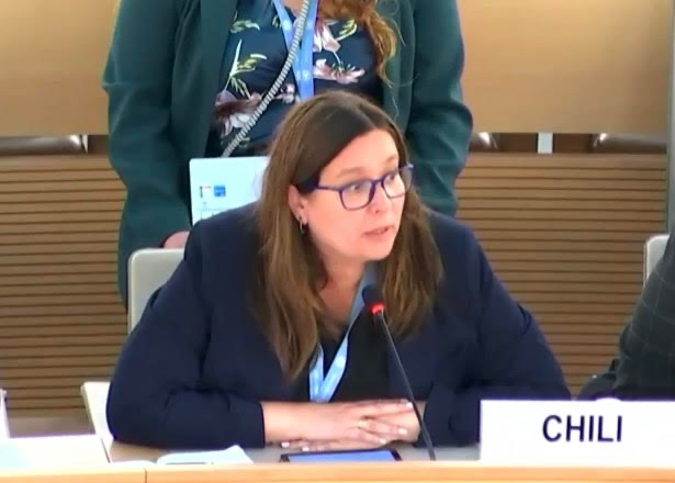 In its role as the guarantor of Colombia's peace process, Chile extended profound appreciation to Mrs Urrejola, for her comprehensive and insightful report on the human rights situation in Colombia. The delegate underscored the report's invaluable contribution in describing the structural impediments to the full realisation of the 2016 Peace Agreement, emphasising its pivotal role as a guiding compass towards sustainable peace. Furthermore, the delegate highlighted the report's clarity in identifying existing challenges and providing tangible recommendations, urging Colombia to embrace it as a blueprint for progress. In a call to action, Chile urged the international community to stand in solidarity with Colombia, reinforcing their support for the country's relentless pursuit of comprehensive peace implementation. It underscored the imperative of collective efforts in translating the recommendations outlined in the Truth Commission report into tangible actions on the ground, thus fostering an environment conducive to lasting peace and prosperity for all Colombians.
In its role as the guarantor of Colombia's peace process, Chile extended profound appreciation to Mrs Urrejola, for her comprehensive and insightful report on the human rights situation in Colombia. The delegate underscored the report's invaluable contribution in describing the structural impediments to the full realisation of the 2016 Peace Agreement, emphasising its pivotal role as a guiding compass towards sustainable peace. Furthermore, the delegate highlighted the report's clarity in identifying existing challenges and providing tangible recommendations, urging Colombia to embrace it as a blueprint for progress. In a call to action, Chile urged the international community to stand in solidarity with Colombia, reinforcing their support for the country's relentless pursuit of comprehensive peace implementation. It underscored the imperative of collective efforts in translating the recommendations outlined in the Truth Commission report into tangible actions on the ground, thus fostering an environment conducive to lasting peace and prosperity for all Colombians.
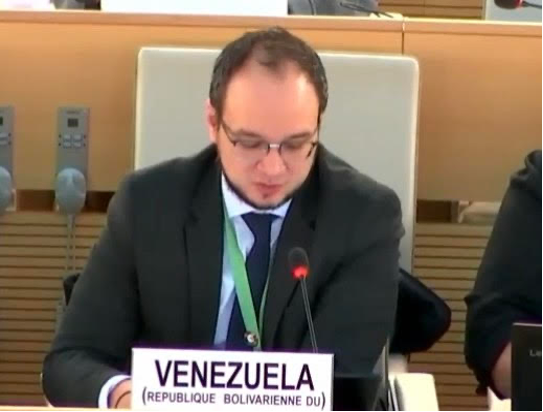 The representative of Venezuela acknowledged the report delivered by the independent, stressing the importance of Item 10 on the council's agenda, aimed at fostering genuine dialogue and cooperation to enhance human rights conditions. Venezuela appreciated Colombia's collaboration with the council and its commitment to implementing measures to benefit its citizens. They commended Colombia's political will to consolidate peace and stability, noting advancements in implementing the 2016 Peace Agreement and transitional justice mechanisms. Venezuela also recognised Colombia's progress in rural reform, emphasising the protection of the rights of rural populations. Calling for international cooperation aligned with Colombia's needs and respecting principles of sovereignty, Venezuela affirmed support for Colombia's endeavours while upholding the UN Charter's universal principles.
The representative of Venezuela acknowledged the report delivered by the independent, stressing the importance of Item 10 on the council's agenda, aimed at fostering genuine dialogue and cooperation to enhance human rights conditions. Venezuela appreciated Colombia's collaboration with the council and its commitment to implementing measures to benefit its citizens. They commended Colombia's political will to consolidate peace and stability, noting advancements in implementing the 2016 Peace Agreement and transitional justice mechanisms. Venezuela also recognised Colombia's progress in rural reform, emphasising the protection of the rights of rural populations. Calling for international cooperation aligned with Colombia's needs and respecting principles of sovereignty, Venezuela affirmed support for Colombia's endeavours while upholding the UN Charter's universal principles.
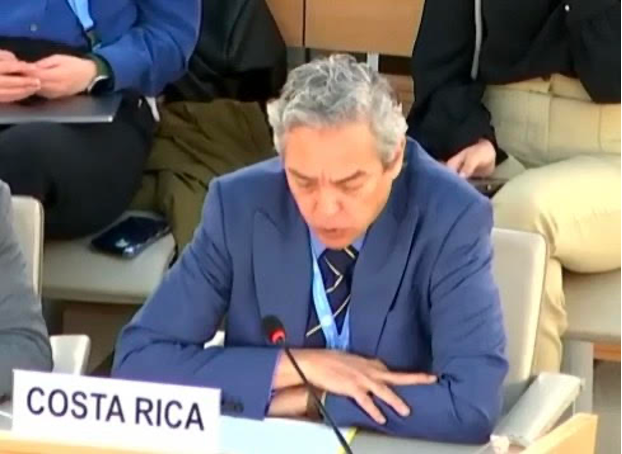 During the interactive dialogue, the representative of Costa Rica extended appreciation for the expert's diligent work and insightful recommendations. Recognising the monumental effort that culminated in the historic Peace Agreement after over 50 years of conflict, Costa Rica underscored the agreement's significance as a pivotal tool for achieving total peace in Colombia. Underlining the need for the agreement to be embraced as a national and local policy, the representative stressed the imperative of strengthening the Special Jurisdiction for Peace to ensure the continuity of its implementation. Costa Rica also applauded Colombia's collaboration with the Office of the High Commissioner and its efforts to support the functions of the JEP. Moreover, the representative reiterated the essential role of continued international support in sustaining the peace process and implementing the recommendations put forth by the Truth Commission.
During the interactive dialogue, the representative of Costa Rica extended appreciation for the expert's diligent work and insightful recommendations. Recognising the monumental effort that culminated in the historic Peace Agreement after over 50 years of conflict, Costa Rica underscored the agreement's significance as a pivotal tool for achieving total peace in Colombia. Underlining the need for the agreement to be embraced as a national and local policy, the representative stressed the imperative of strengthening the Special Jurisdiction for Peace to ensure the continuity of its implementation. Costa Rica also applauded Colombia's collaboration with the Office of the High Commissioner and its efforts to support the functions of the JEP. Moreover, the representative reiterated the essential role of continued international support in sustaining the peace process and implementing the recommendations put forth by the Truth Commission.
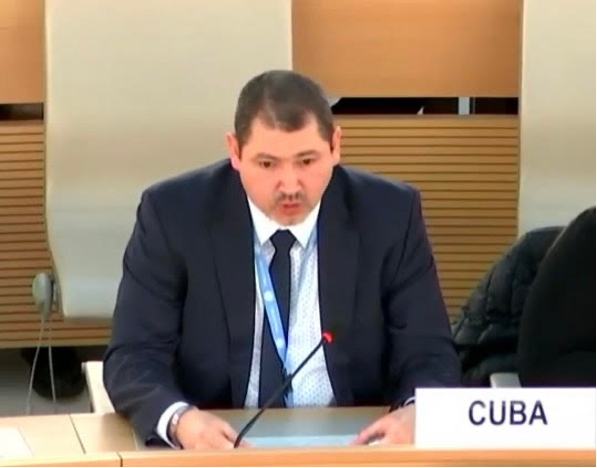 In his capacity as the Permanent Representative of Cuba, Ambassador Juan Antonio Quintanilla Román expressed gratitude to the expert for her insightful presentation on the implementation of the 2016 Peace Agreement in Colombia. He acknowledged Colombia's commitment, under President Gustavo Petro's leadership, to collaborating with Mrs Urrejola and providing access to the necessary State structures. Emphasising the importance of redoubling efforts to implement the report's recommendations aligned with Colombia's priorities, he highlighted the practical benefits of prioritising mutual understanding and cooperation over punitive measures. He also affirmed Cuba's historical role as a guarantor and host of peace dialogues in Colombia, reaffirming Cuba's unwavering support for peace, development, and social justice in Colombia and the wider Latin American and Caribbean region.
In his capacity as the Permanent Representative of Cuba, Ambassador Juan Antonio Quintanilla Román expressed gratitude to the expert for her insightful presentation on the implementation of the 2016 Peace Agreement in Colombia. He acknowledged Colombia's commitment, under President Gustavo Petro's leadership, to collaborating with Mrs Urrejola and providing access to the necessary State structures. Emphasising the importance of redoubling efforts to implement the report's recommendations aligned with Colombia's priorities, he highlighted the practical benefits of prioritising mutual understanding and cooperation over punitive measures. He also affirmed Cuba's historical role as a guarantor and host of peace dialogues in Colombia, reaffirming Cuba's unwavering support for peace, development, and social justice in Colombia and the wider Latin American and Caribbean region.
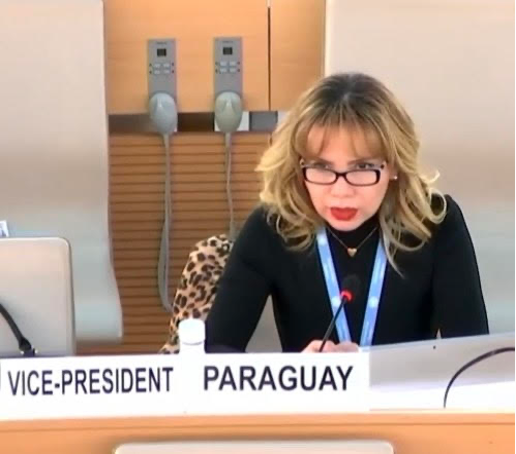
The delegate of Paraguay expressed gratitude for the report, emphasising the importance of assessing progress through a human rights perspective. They commended all parties involved in the agreement for their commitment to advancing its implementation. Paraguay's delegate underscored the need for rigorous monitoring by the National Commission for Security Guarantees, especially concerning the recent policy on dismantling criminal organisations. They emphasised the necessity of addressing coordination challenges through the establishment of a unified high-level entity to facilitate dialogue among stakeholders. Paraguay's delegate valued the Colombian government's openness and collaboration with UN mechanisms, demonstrating its dedication to promoting and protecting human rights.
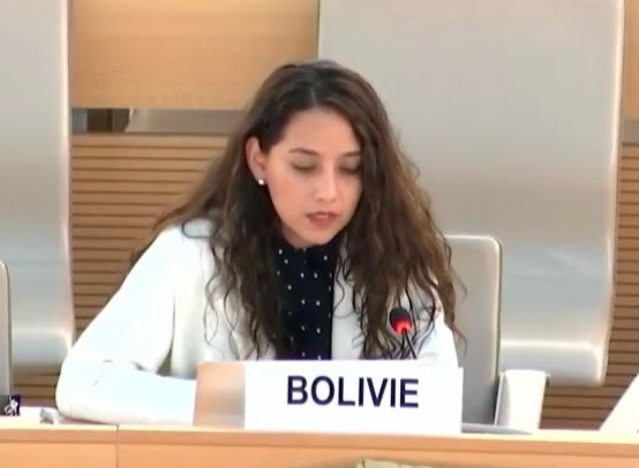 The delegate of Bolivia appreciated the recommendations concerning public policies aimed at respecting the rights of the Campesino people, aligning with UN guidelines for rural areas. Bolivia recognised Colombia's support for these policies. Despite ongoing challenges in implementing the peace accords, Bolivia emphasised the necessity of persisting on the path to peace in Colombia. They noted progress in institutional reforms, transitional justice, and agrarian reform, highlighting the inclusive participation of women and indigenous communities. Bolivia affirmed its support for the government's endeavours to implement the peace accords, guided by the report and conclusions of the Truth Commission, aimed at addressing the conflict's structural causes and advancing reconstruction efforts.
The delegate of Bolivia appreciated the recommendations concerning public policies aimed at respecting the rights of the Campesino people, aligning with UN guidelines for rural areas. Bolivia recognised Colombia's support for these policies. Despite ongoing challenges in implementing the peace accords, Bolivia emphasised the necessity of persisting on the path to peace in Colombia. They noted progress in institutional reforms, transitional justice, and agrarian reform, highlighting the inclusive participation of women and indigenous communities. Bolivia affirmed its support for the government's endeavours to implement the peace accords, guided by the report and conclusions of the Truth Commission, aimed at addressing the conflict's structural causes and advancing reconstruction efforts.
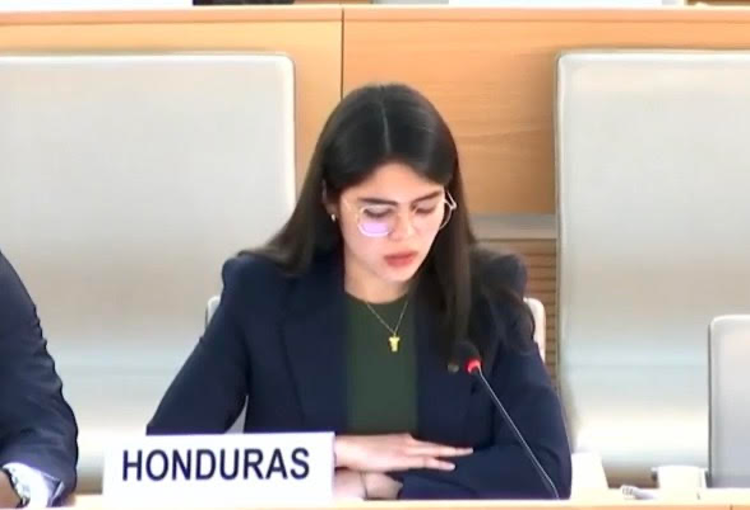 The representative of Honduras reiterated its support for Colombia and its government's commitment to strengthening international cooperation to make progress on the protection of all human rights. Progress acknowledged in the report, particularly regarding transitional and restorative justice, as well as the implementation of rural development policies, including substantive progress regarding funding, was highlighted. The delegation also noted the call for continued support from the international community for the implementation of the peace accords and the role of civil society in this respect. The challenges highlighted by the expert, such as weaknesses in inter-institutional coordination and corruption, were acknowledged. At the same time, it was believed that there was a genuine opportunity to promote appropriate solutions tailored to the national context to foster citizen trust.
The representative of Honduras reiterated its support for Colombia and its government's commitment to strengthening international cooperation to make progress on the protection of all human rights. Progress acknowledged in the report, particularly regarding transitional and restorative justice, as well as the implementation of rural development policies, including substantive progress regarding funding, was highlighted. The delegation also noted the call for continued support from the international community for the implementation of the peace accords and the role of civil society in this respect. The challenges highlighted by the expert, such as weaknesses in inter-institutional coordination and corruption, were acknowledged. At the same time, it was believed that there was a genuine opportunity to promote appropriate solutions tailored to the national context to foster citizen trust.
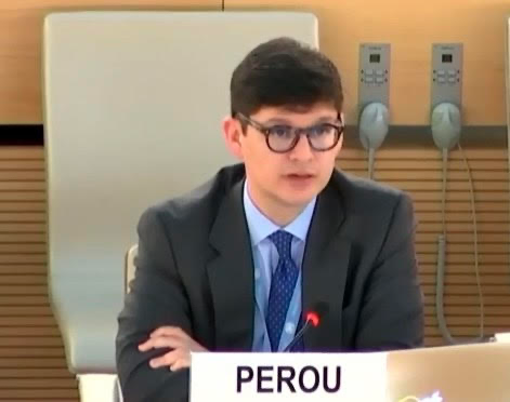 The delegate of Peru underscored the significance of addressing the persistent challenges posed by high levels of violence perpetrated by non-state actors and armed groups, particularly affecting vulnerable communities such as rural populations, indigenous groups, and Afro-Colombian communities. In alignment with recommendations made during Colombia's Universal Periodic Review in November, the delegate stressed the imperative of redoubling efforts to advance the implementation of the ethnic chapter and gender provisions of the peace accords, recognising them as vital steps towards achieving lasting peace and promoting human rights in Colombia.
The delegate of Peru underscored the significance of addressing the persistent challenges posed by high levels of violence perpetrated by non-state actors and armed groups, particularly affecting vulnerable communities such as rural populations, indigenous groups, and Afro-Colombian communities. In alignment with recommendations made during Colombia's Universal Periodic Review in November, the delegate stressed the imperative of redoubling efforts to advance the implementation of the ethnic chapter and gender provisions of the peace accords, recognising them as vital steps towards achieving lasting peace and promoting human rights in Colombia.
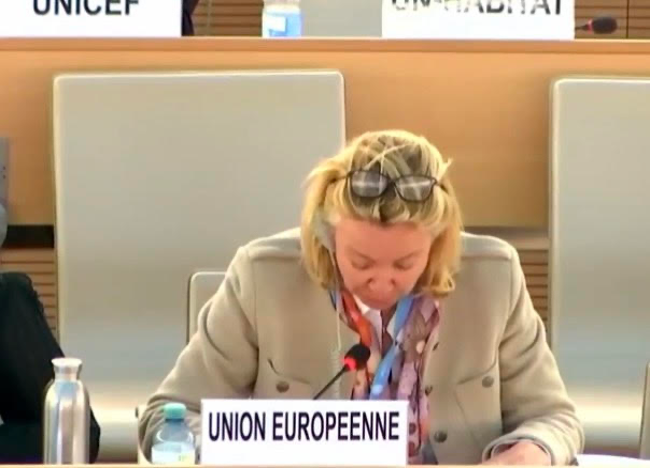 The EU expressed gratitude to Mrs Urrejola for her thorough report, underscoring the longstanding partnership between the European Union and Colombia in promoting sustainable peace and respect for human rights. They commended the progress made in areas such as rural reform and transitional justice, citing the Integrated System of Truth, Justice, and Reparations as a notable achievement. Despite these advancements, the EU acknowledged the persistent challenges hindering the full implementation of the 2016 Peace Agreement, including ongoing violence targeting social leaders, human rights defenders, and signatories of the agreement, as well as other criminal activities such as kidnappings, extortion, and forced recruitment, particularly affecting minors. Additionally, they expressed concern about the slow progress in implementing the ethnic and gender provisions of the agreement and the high levels of impunity and corruption. The EU welcomed the recommendations outlined in the report and stressed the importance of enhancing state presence in conflict-affected regions and ensuring the comprehensive, participatory, and coordinated implementation of security and protection policies. They sought insight into how the international community could further support Colombia's efforts to achieve lasting peace and address the underlying causes of conflict effectively.
The EU expressed gratitude to Mrs Urrejola for her thorough report, underscoring the longstanding partnership between the European Union and Colombia in promoting sustainable peace and respect for human rights. They commended the progress made in areas such as rural reform and transitional justice, citing the Integrated System of Truth, Justice, and Reparations as a notable achievement. Despite these advancements, the EU acknowledged the persistent challenges hindering the full implementation of the 2016 Peace Agreement, including ongoing violence targeting social leaders, human rights defenders, and signatories of the agreement, as well as other criminal activities such as kidnappings, extortion, and forced recruitment, particularly affecting minors. Additionally, they expressed concern about the slow progress in implementing the ethnic and gender provisions of the agreement and the high levels of impunity and corruption. The EU welcomed the recommendations outlined in the report and stressed the importance of enhancing state presence in conflict-affected regions and ensuring the comprehensive, participatory, and coordinated implementation of security and protection policies. They sought insight into how the international community could further support Colombia's efforts to achieve lasting peace and address the underlying causes of conflict effectively.
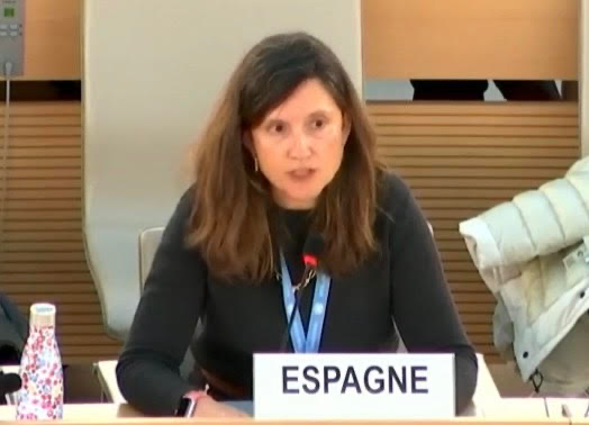 The delegate of Spain, echoing the EU's stance, expressed appreciation for the independent expert's intervention and endorsed the presence of the Office of the High Commissioner in Colombia, emphasising its role in safeguarding human rights. Spain reiterated support for Colombia's ongoing reforms and the pursuit of broad and lasting peace through the Total Peace project. Stressing the importance of protecting vulnerable groups, including human rights defenders and indigenous communities, Spain underscored the need for comprehensive state support to ensure accountability for crimes, provide adequate reparation to victims, and prevent further violations. Spain pledged continued assistance to Colombia across various cooperation and support initiatives.
The delegate of Spain, echoing the EU's stance, expressed appreciation for the independent expert's intervention and endorsed the presence of the Office of the High Commissioner in Colombia, emphasising its role in safeguarding human rights. Spain reiterated support for Colombia's ongoing reforms and the pursuit of broad and lasting peace through the Total Peace project. Stressing the importance of protecting vulnerable groups, including human rights defenders and indigenous communities, Spain underscored the need for comprehensive state support to ensure accountability for crimes, provide adequate reparation to victims, and prevent further violations. Spain pledged continued assistance to Colombia across various cooperation and support initiatives.
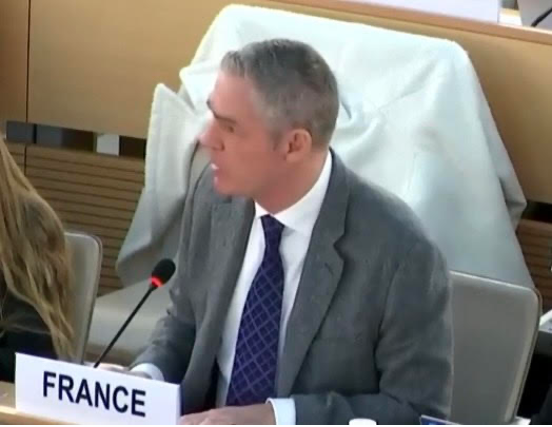 The delegate of France highlighted the enduring partnership between France and Colombia in advancing sustainable peace and human rights. They praised Colombia's strides in rural reform, transitional justice, and negotiations with armed groups, emphasising the importance of the Integrated System of Truth, Justice, and Reparations. However, acknowledging persistent challenges, including violence against social leaders, human rights defenders, and minors, as well as slow progress in implementing ethnic and gender provisions, France underscored the need for robust international support. They emphasised the urgency of enhancing state presence in conflict-affected areas and implementing comprehensive security policies to address underlying causes effectively. Finally, they sought insights into how the international community could further bolster Colombia's efforts toward lasting peace and conflict resolution.
The delegate of France highlighted the enduring partnership between France and Colombia in advancing sustainable peace and human rights. They praised Colombia's strides in rural reform, transitional justice, and negotiations with armed groups, emphasising the importance of the Integrated System of Truth, Justice, and Reparations. However, acknowledging persistent challenges, including violence against social leaders, human rights defenders, and minors, as well as slow progress in implementing ethnic and gender provisions, France underscored the need for robust international support. They emphasised the urgency of enhancing state presence in conflict-affected areas and implementing comprehensive security policies to address underlying causes effectively. Finally, they sought insights into how the international community could further bolster Colombia's efforts toward lasting peace and conflict resolution.
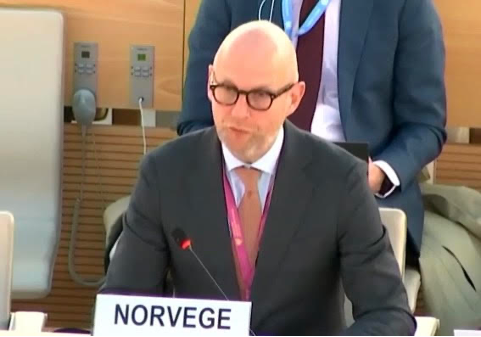 Ambassador Mr Tormod C. Endresen, representing the Nordic-Baltic countries, emphasised deep concerns regarding the plight of human rights defenders and agreement signatories. He urged sustained efforts to bolster security measures and enhance accountability mechanisms, notably through the strengthening of the National Protection Unit and the re-establishment of the National Round Table for Security Guarantees. Furthermore, he called upon Colombia's Attorney General's Office to expedite efforts toward ensuring accountability for human rights violations and abuses.
Ambassador Mr Tormod C. Endresen, representing the Nordic-Baltic countries, emphasised deep concerns regarding the plight of human rights defenders and agreement signatories. He urged sustained efforts to bolster security measures and enhance accountability mechanisms, notably through the strengthening of the National Protection Unit and the re-establishment of the National Round Table for Security Guarantees. Furthermore, he called upon Colombia's Attorney General's Office to expedite efforts toward ensuring accountability for human rights violations and abuses.
NGOs and civil society organisations
The group of national human rights institutions and nongovernmental organisations welcomed the report by the international expert on the peace accords in Colombia, appreciating her efforts in identifying obstacles to their implementation. They stressed the importance of the Peace Agreement as a central part of the state's long-term and medium-term peace policy, emphasising that comprehensive implementation was crucial for achieving lasting peace. They called for cooperation among different institutions to make progress on dismantling criminal structures and ensuring effective investigations. The group highlighted the need to respect the independence of the special jurisdiction for peace and urged consultations with victims to ensure the legitimacy of restorative justice measures. They expressed concern about ongoing violence against human rights defenders and environmental activists, delays in addressing ethnic and gender dimensions, and impunity for crimes. The group called for greater efforts in addressing institutional weaknesses, improving state action in affected territories, and ensuring protection for organisations and communities defending human rights. They urged the international community to support these efforts. Additionally, they emphasised the need for the Colombian government to prioritise the rights of victims and communities in implementing the Peace Agreement and to address challenges such as weaknesses in inter-institutional coordination and corruption. They stressed the importance of implementing commitments under ratified international human rights conventions and adopting reforms to ensure the safety and rights of all citizens, including demilitarisation of the police force and regulation of policing during protests.
Concluding remarks
Ms. Urijola concluded her remarks by addressing several key points raised during the session. She emphasised the fundamental challenge facing Colombia in ensuring that the peace agreement is upheld as a commitment of the entire state, regardless of changes in government. Highlighting the importance of addressing the continuum of violence and the presence of unlawful armed groups, she stressed the need for urgent action on implementing policies for dismantling criminal organisations and enhancing security measures.
Ms. Urijola underscored the essential role of the international community in supporting Colombia's peace process and defending the Peace Agreements. She emphasised the importance of consistency and follow-up on international commitments, particularly in protecting human rights defenders and implementing measures with a gender and ethnic dimension. She also highlighted the need for coordination between the Peace Agreements and current dialogues with armed groups, emphasising the role of civil society and the importance of ethnic, gender, and territorial-based approaches in peacebuilding efforts.
Regarding accountability for human rights violations, Mrs Urijola called for progress in identifying intellectual perpetrators and addressing impunity. She emphasised the need for better inter-institutional coordination to avoid duplication of functions and ensure comprehensive implementation of the Peace Agreement. Mrs Urijola expressed gratitude to the Office of the High Commissioner, the UN Verification Mission, civil society, victims' organisations, signatories to the agreements, and the Colombian government for their cooperation and support throughout her mandate.
Geneva International Centre for Justice (GICJ) welcomes Colombia’s government efforts in implementing the 2016 Peace Agreement. However, we note the significant hindrances to ensuring accountability and justice.
GenevaInternationalCentreforJustice, Geneva4Justice, HumanRights, HRC55, Colombia PeaceAgreement Challenges







